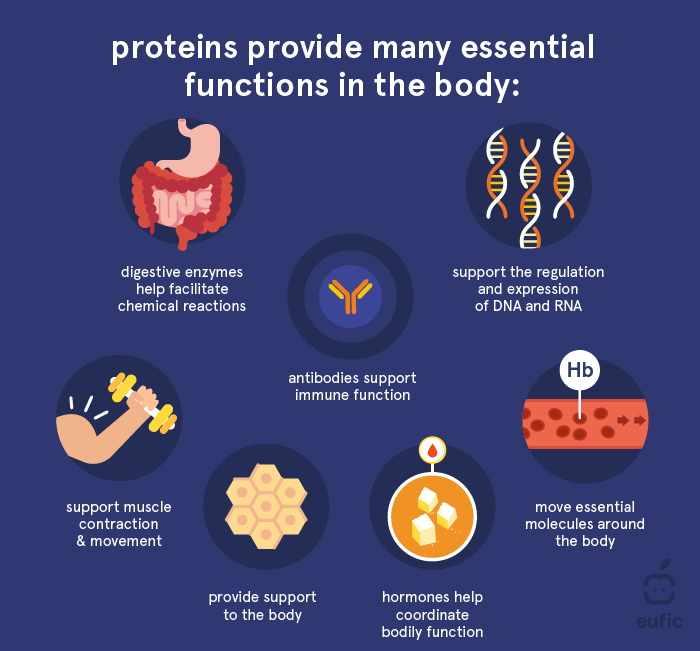I know it can’t just be me that has noticed this, but many common foods and recipes have been pushing the “high-protein” agenda for some time. And why is that? Should we be concerned about not having enough protein in our diet? More importantly, what is protein and do we need to include more in our diets?
Protein is one of the three macronutrients the body needs to produce energy. Each gram of protein provides us with 4 calories of energy. I like to think of proteins as the builder macronutrient because it is one of the most important building blocks for the body. Proteins are made from hundreds of smaller molecules called amino acids, which can combine in a variety of ways to produce:
- Muscles
- Enzymes
- Hormones
- Immune cells
- Skin
- Hair
- Nails
Although the body can recycle its protein through the breakdown of older proteins, it’s not a perfect process. This is why having adequate amounts of good quality protein in our diet is important to carry out repairs, maintenance and growth.

Essential vs Non-essential AAs and Protein Quality
There are 20 amino acids found in nature, 9 of which are essential because humans cannot create them in sufficient amounts and so, we must get them from our diet. The order of the amino acids in a protein will determine the way the protein folds and performs.
| Essential amino acid | Non-essential amino acids |
|---|---|
| Histidine Isoleucine Leucine Lysine Methionine Phenylalanine Threonine Tryptophan Valine | Alanine Arginine* Asparagine Aspartate Cysteine* Glutamate Glutamine* Glycine* Proline* Serine Taurine* Tyrosine* |


We can get protein from a variety of sources, including plant foods and animals. Usually, animal proteins are also viewed as superior in quality or “complete” because of higher amounts of essential amino acids and their ability to be easily digested by the body, in comparison to plant proteins. For example, eggs, whole milk and chicken breast are high-quality proteins.
But this also does not mean that plant proteins aren’t good. As we saw with both carbohydrates and fats, plants also have other benefits such as fibre and unsaturated fat, shown to reduce the risk of high blood pressure, diabetes, colon-rectal cancer and heart disease.
Daily requirements
Typically, the daily protein recommendation of an average adult is 0.8g for each kilogram (kg) of body weight or 20-25% of your daily energy requirement. So, the recommendation for a 70 kg individual would be 56g of protein per day. (BTW, this isn’t straight-up 56g of meat or nuts).

EUFIC as well as the BNF have wonderful information on what you could include daily. Two – three servings of animal protein or 4 – 5 servings of plant-based protein (or a combination of both) could provide you with sufficient protein for the day, in addition to other nutrients.
However, during childhood, adolescence, pregnancy and breastfeeding there is a higher demand for protein. Elderly populations (>65 years) also have different protein requirements to reduce the loss of skeletal muscle mass (sarcopenia). You can always speak to a Registered (Associate) Nutritionist or Registered dietitian if you need more details on your own individual needs.
So, what about those following a plant-based lifestyle such as veganism or vegetarianism? Are they at risk of protein deficiency?
Persons may choose more sustainable sources of protein and live plant-based due to the environmental impacts of animal farming. Despite plant-protein having limitations on the number of essential amino acids, protein deficiency is uncommon among vegans and vegetarians. Also, we do not typically have issues digesting plant-proteins.
The more diverse your diet is, the more sources of essential amino acids. Plant proteins include grains like wheat, rice, quinoa, as well as legumes, nuts and seeds (chickpeas, nuts and beans).
Why the hype over proteins then?
Eating foods which are high in protein can be more filling than those high in fat and carbohydrates. Some short-term studies have suggested that high-protein diets could reduce the calories one eats, but this doesn’t mean that kind of diet will maintain weight loss. If you ask me, there are additional factors consider with a high-protein diet… that may also affect satiety, calorie reduction and overall satisfaction.

For instance, some naturally high-protein plant foods such as beans and nuts also provide fibre and unsaturated fats. While chicken, fish or beef are good sources of complete protein as well as a part of the cuisine for many cultures. However, animal meats can be high in saturated fat, and cooking methods may also include the addition of sugar, salt and fat, which we know is associated with a decline in heart health.
If we also look at the amount of animal- or plant-based protein a person may eat in one sitting, this could also affect the calorie-reducing effect. I know I could eat a cereal-bowl of nuts and still want more, while others enjoy large portions of meat with every meal.

Despite what the food and supplement industries want you to believe, for most of us with access to a neighbourhood high street, supermarkets, shopping centres, running water and adequate cooking facilities, there are very few instances of protein deficiency in developed countries. In fact, in Europe, UK and USA, daily protein requirements are generally exceeded by both men and women. I know for Barbadians meat is a big part of our evolving culture. Every “good” meal must come with a big piece of meat (if you have the means). Although consuming very high amounts of protein has not been shown to be toxic or “bad”, having an excess of any macronutrient can lead to weight gain. The amino group of the protein is detoxified by the liver and is passed out in urine, while the rest of the molecule is converted to and stored as fat.
And in talking to some friends the other day, I came across the opposite issue. Kwashiorkor and Marasmus which are protein energy malnutrition conditions children in extreme poverty in low-income countries suffer from. It is heart-breaking to see.
I’d advise diversifying your eating habits to get protein from several natural sources throughout the day, instead of looking to a discretionary or snack foods (which do not naturally contain high amounts of protein) such as breakfast bars, chips or cookies.
Have you ever fallen prey to the “high-protein” nutrition claim on a product or recipe? What’s you’re go-to food when you think of protein?

If you are concerned about your own consumption of protein, you should have a chat with a registered associate nutritionist (like me) or registered dietitian before making big changes to your diet.
Resources:
- British Nutrition Foundation Beans, pulses, fish, eggs, meat and other proteins. https://www.nutrition.org.uk/healthyliving/healthydiet/protein.html?limitstart=0. Accessed 16 Jan 2020
- British Nutrition Foundation (2012) Protein. In: British Nutrition Foundation. https://www.nutrition.org.uk/nutritionscience/nutrients-food-and-ingredients/protein.html?start=2. Accessed 19 Oct 2020
- EUFIC (2019) What Are Proteins and What Is Their Function in the Body? https://www.eufic.org/en/whats-in-food/category/proteins. Accessed 19 Oct 2020
- https://www.eufic.org/en/whats-in-food/category/proteins
- https://www.eufic.org/en/whats-in-food/article/plant-based-protein-sources-for-vegans-and-vegetarians-infographic